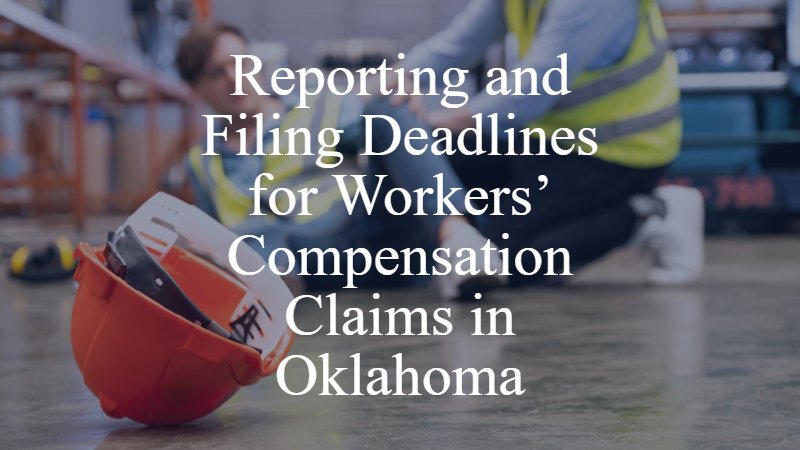Workers’ Compensation Deadlines and Filing Windows in Oklahoma
Suffering an on-the-job injury in Oklahoma is not only painful and potentially debilitating, but it also causes tremendous financial stress, with adverse impacts on entire families. Fortunately, workers’ compensation in Oklahoma provides a crucial safety net for workplace injury victims; however, a significant number of injured employees receive claim denials due to filing errors, missed deadlines, and other oversights.
Understanding how filing windows and deadlines impact your Oklahoma workers’ compensation claim is the first step toward obtaining the compensation you deserve.

Meeting Essential Reporting and Filing Deadlines for Oklahoma Workers’ Compensation Claims
It’s critical to take purposeful action as soon as possible after suffering a workplace injury in Oklahoma. While obtaining critical medical care should always be the immediate priority, a successful workers’ compensation claim requires the injury victim to report the injury and meet filing deadlines.
According to the Oklahoma (2-CO-1C-05), Report of Injury/Accident, the state outlines the essential deadlines as follows.
Reporting an Injury to an Employer
Workplace injury victims must first report the injury to their immediate supervisor as soon as possible, or at least before the end of the shift or workday. Then, the injury victim must report the injury to their employer in writing within 30 days of the injury date. Oklahoma states the following regarding the failure to meet this crucial deadline:
“If more than 30 days have elapsed between the accident/injury and reporting of the accident/injury or no medical attention was received in the first 30 days (85A O.S. § 68, §302), the facility/region/unit HRMS will notify the employee that the authenticity of the claim will be questioned and the claim may be denied …”
It’s also beneficial to note that a settlement for workers’ compensation benefits begins on three days after notifying an employer, making it all the more important to notify an employer in writing as soon as possible after an injury to receive the maximum compensation.
The Deadline for Filing a Workers’ Compensation Claim in Oklahoma
An employee injured while on the job has one year from the accident date to file a workers’ compensation claim. Filing beyond this deadline allows workers’ compensation to deny the claim and may require an appeal process and compelling evidence.
For slowly developing work injuries, such as repetitive motion injuries, employees have up to a year after the last work day to file a claim.
If a workplace injury results in death, the closest surviving family member has up to two years after the death to file a workers’ compensation claim for death benefits.
Frequently Asked Questions About Workers’ Compensation Deadlines
How Long Does My Employer Have to Notify Workers’ Compensation About My Injury?
The employer must notify their workers’ compensation insurance of the accident and injury within 30 days of receiving notice. When an employer fails to report an injury within the deadline, the injury victim must file a complaint with the workers’ compensation board, which can result in a delay in receiving benefits. Employers face penalties for neglecting to report injuries.
What If I Did Not Seek Medical Treatment Right Away?
It’s always best to go directly to a hospital or urgent care center the moment you suffer an injury or suspect that you’ve been injured at work. However, failing to seek treatment right away doesn’t mean you cannot file for workers’ compensation benefits. Instead, this failure means that the burden of proving your injury occurred at work now falls to you.
What If I Missed the 30-Day Deadline to Report the Injury?
Reporting the injury within 30 days of the accident or incident means you enjoy the legal presumption that the injury occurred at work. Missing the deadline means you no longer have the presumption of truth. You may still receive approval of your claim by providing evidence that the injury occurred at work, required medical treatment, and interfered with your earning ability.
Do I Need a Workers’ Compensation Lawyer for My Claim?
Private insurance companies provide workers’ compensation insurance to employers, which means protecting their profits is a high priority. For this reason, it’s not uncommon for injury victims to receive a denial or undervalued claim. A workers’ compensation attorney protects the injury victim’s best interests by ensuring that their client meets all filing deadlines and then assertively advocates for the maximum settlement available to them.
Contact an Oklahoma City Workers’ Compensation Lawyer for Support
Understanding Oklahoma’s workers’ compensation deadlines can be challenging, especially while you’re recovering from an injury. If your claim has been denied or you need help navigating the filing process, contact an experienced workers’ compensation attorney in Oklahoma City for guidance. The right legal support can make all the difference in securing the benefits you deserve.